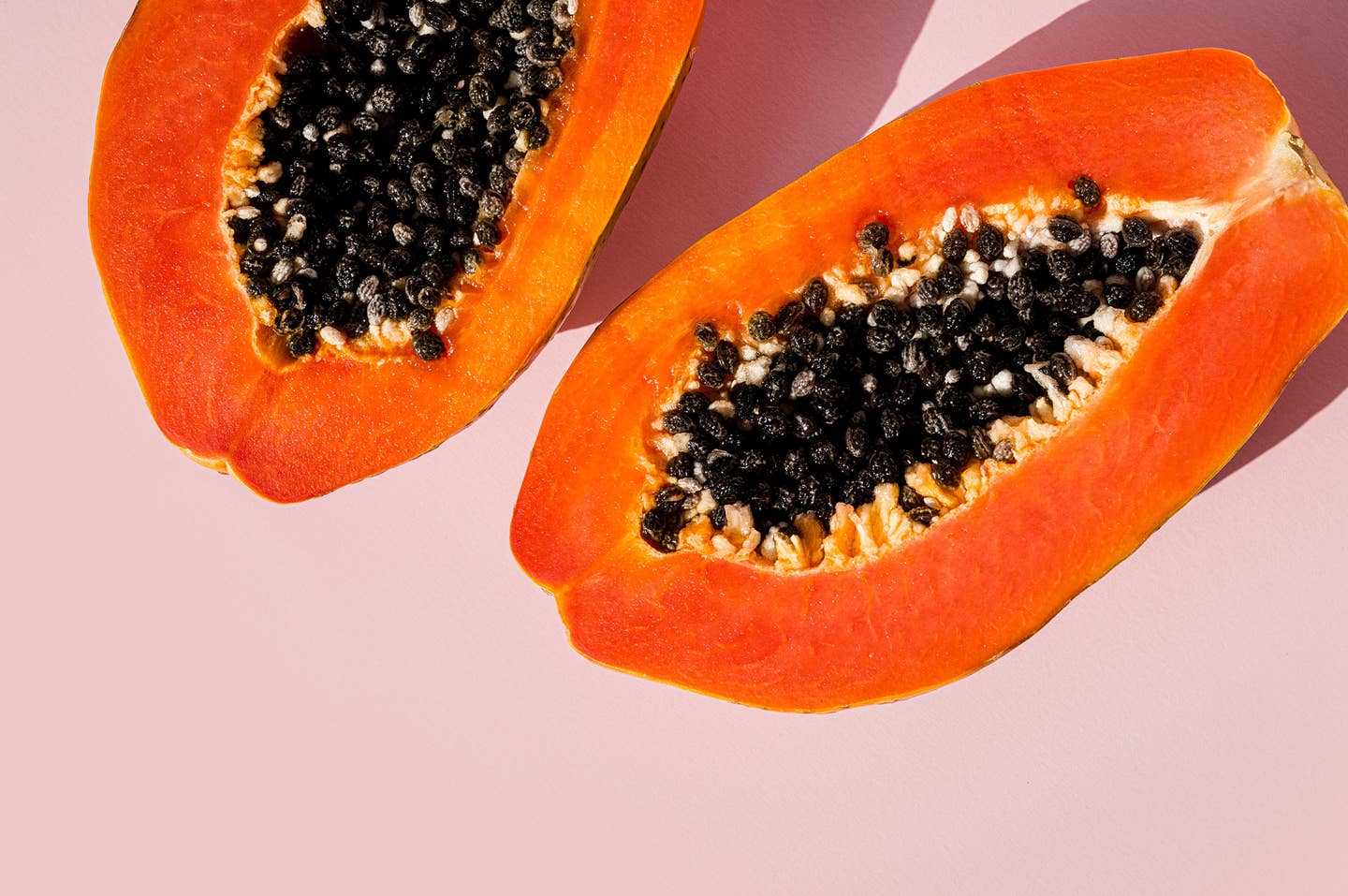
Add Papaya to Your Smoothie to Lower Risk of Disease and Fight Aging
If you think that papaya is only a warm-weather fruit, or to be enjoyed on vacation in a tropical paradise with a slice of mint, you're missing out on the amazing benefits the bright orange fruit has to offer. Studies show that papaya, with its lycopene-filled flesh, packs in more antioxidants and vitamins per 100 grams than almost any other fruit. Lycopene is known to reduce inflammation linked to major diseases, and eating a high-lycopene diet helps lower your risk of certain cancers and protects your skin from sun damage and early signs of aging.
Studies also suggest that eating lycopene helps fight inflammation, which contributes to chronic diseases such as heart disease, type 2 diabetes, arthritis, Crohn's disease, and more. But, that's not the only reason to love papaya.
Pregnant Women Should Avoid Papaya Seeds and Unripe Papaya
Unripe or green papaya contains high levels of what's called papaya latex, a milky liquid that can be potentially harmful to pregnant women since it has been known to lead to uterine contractions. The seeds are also known to spur contractions so if you are pregnant, doctors warn you to not eat papaya.
Papaya is a favorite for anyone who loves tropical fruit since it's a combination between cantaloupe and mango, with a softer texture, and a butter-like consistency that melts in your mouth. If you find it too rich, mix it into smoothies and use it to sweeten any recipe instead of other juice.
Here Are The 5 Science-Backed Health Benefits of Papaya
1. Papaya is Highly Nutritious and Low in Calories
Half of small papaya contains more vitamin c than a single orange. It has 87 milligrams per cup or 157 percent of your recommended daily requirement of vitamin C, so eating papaya in the cold winter months is an immune booster.
Half of small papaya also contains 33 percent of your recommended daily requirement of Vitamin A, which is also great for immunity, as well as eyesight. The same half papaya will deliver 14 percent of your recommended requirement of Vitamin B9, which helps support healthy cell function. This folate vitamin also will help you feel less sluggish.
Papaya gets all this done efficiently, with only 62 calories in a cup, which is extremely low for sweet fruit. Papaya is a good source of fiber, packing in nearly 3 grams per serving. Because most fruits do not contain protein, papaya is unique in that it contains 1 gram of plant-based protein.
2. Papaya Contains Lycopene, a Powerful Antioxidant That Lowers Cancer Risk
Studies show that the lycopene in papaya helps protect your body from damage caused by free radicals. Think of free radicals as negative ions that cause trouble, and the antioxidants as positive forces that neutralize them. By eating lycopene you lower your levels of oxidative stress, which is linked to chronic diseases, such as some cancers, type 2 diabetes, heart disease, and Alzheimer's, according to this study. By eating foods containing lycopene such as tomatoes, watermelon, guava, and papaya, you protect your body from the risk of disease.
Another study indicated that "higher lycopene consumption was linearly associated with a reduced risk of prostate cancer," and the study also stated: "there was a trend that with higher lycopene intake, there were reduced incidence of prostate cancer."
3. Papaya Helps Fight Inflammation that Causes Disease. 2 Servings a Day is Enough
Chronic inflammation is a leading cause of many lifestyle diseases such as heart disease and type 2 diabetes and high blood pressure. In fact, when you eat the typical American diet that is full of animal products and processed foods, your cells become inflamed even if you don't realize it. This cellular inflammation causes the body to age faster, according to several studies. The best way to avoid this type of unhealthy inflammation and reduce the risk of disease is by eating a healthy, clean, whole-foods, plant-based diet. Studies prove that fruits and vegetables high in antioxidants, including papaya, help reduce this inflammation.
You don't need a lot of fruits and vegetables to make an impact on your health. In one study, a trial group of nonsmoking men consumed 2 servings of fruits and vegetables for 4 weeks, increasing their average intake up 5 servings and then to 8 servings a day. Results found that a moderate intake of vegetables and fruits may reduce inflammation as effectively as eating more fruits and vegetables. So you can add 2 a day and get the benefits your body needs. Still, those who ate more did register higher levels of healthy carotenoid and other cancer-fighting compounds and were even healthier, but if the goal is to reduce inflammation, 2 servings a day gets the job done.
4. Papaya as Part of a High-Fiber Diet, Can Help You Lose Weight
Tropical fruit tends to be lower in fiber than hearty choices like an apple, yet, papaya delivers all the sweetness and fiber that you need when you want a sweet snack but you are trying to stay away from added sugar. One small papaya contains 3 grams of fiber, making it a perfect addition to a smoothie or acai bowl, and an easy afternoon snack.
High-fiber foods are linked to weight loss because they fill you up and make your body burn calories slowly. The soluble fiber in papaya slows down the digestion rate of other nutrients (like carbohydrates that you eat) and prevents sharp spikes in blood sugar, therefore you feel full quicker and stay full longer, which makes it easier to lose weight, according to research. And because your body isn't rapidly digesting food, when you eat high-fiber foods like papaya, you won't experience a sugar crash or feel hungry soon after eating.
5. Papaya May Protect Against Damage and Help You Achieve Youthful-Looking Skin
For younger-looking skin that does not show damage from the sun or other environmental elements, eating papaya can turn back the clock, since its high levels of vitamin C and lycopene act as potent antioxidants that have been proven to help reduce signs of aging. These two powerful compounds are known for their anti-aging properties.
Vitamin C stimulates collagen growth and collagen is the underlying structure of your skin. It also protects your skin cells against damage from UV light, according to a study.
Lycopene is known to reduce wrinkles by making skin smoother. In a study, post-menopausal women consumed a supplement of lycopene and vitamin C, and after 14 weeks they found that their wrinkles had become smoother and their complexions younger looking. This may be one reason that many natural skincare products include papaya extract for its smooth, clear skin properties.
The body's aging process starts at 30 years of age, sooner than you may have expected. One way to slow the impact of aging on your skin and body is to eat a diet rich in fruit vegetables and add high fiber, vitamin-packed foods like papaya to your plate.
More From The Beet






